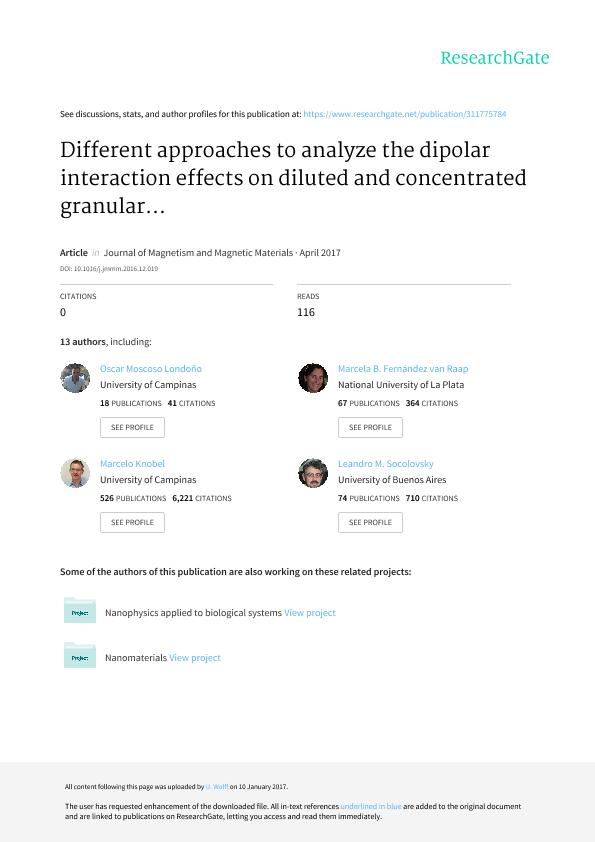Mostrar el registro sencillo del ítem
dc.contributor.author
Moscoso Londoño, Oscar

dc.contributor.author
Tancredi, PABLO

dc.contributor.author
Muraca, Diego

dc.contributor.author
Mendoza Zélis, Pedro

dc.contributor.author
Coral, Diego Fernando

dc.contributor.author
Fernández van Raap, Marcela Beatriz

dc.contributor.author
Wolff, U.
dc.contributor.author
Neu, V.
dc.contributor.author
Damm, C.
dc.contributor.author
de Oliveira, C.L.P.
dc.contributor.author
Pirota, K.R.
dc.contributor.author
Knobel, Marcelo

dc.contributor.author
Socolovsky, Leandro Martín

dc.date.available
2018-06-07T13:50:57Z
dc.date.issued
2017-04
dc.identifier.citation
Moscoso Londoño, Oscar; Tancredi, PABLO; Muraca, Diego; Mendoza Zélis, Pedro; Coral, Diego Fernando; et al.; Different approaches to analyze the dipolar interaction effects on diluted and concentrated granular superparamagnetic systems; Elsevier Science; Journal of Magnetism and Magnetic Materials; 428; 4-2017; 105-118
dc.identifier.issn
0304-8853
dc.identifier.uri
http://hdl.handle.net/11336/47631
dc.description.abstract
Controlled magnetic granular materials with different concentrations of magnetite nanoparticles immersed in a non-conducting polymer matrix were synthesized and, their macroscopic magnetic observables analyzed in order to advance towards a better understanding of the magnetic dipolar interactions and its effects on the obtained magnetic parameters. First, by means of X-ray diffraction, transmission electron microscopy, small angle X-ray scattering and X-ray absorption fine structure an accurate study of the structural properties was carried out. Then, the magnetic properties were analyzed by means of different models, including those that consider the magnetic interactions through long-range dipolar forces as: the Interacting Superparamagnetic Model (ISP) and the Vogel-Fulcher law (V-F). In systems with larger nanoparticle concentrations, magnetic results clearly indicate that the role played by the dipolar interactions affects the magnetic properties, giving rise to obtaining magnetic and structural parameters without physical meaning. Magnetic parameters as the effective anisotropic constant, magnetic moment relaxation time and mean blocking temperature, extracted from the application of the ISP model and V-F Law, were used to simulate the zero-field-cooling (ZFC) and field-cooling curves (FC). A comparative analysis of the simulated, fitted and experimental ZFC/FC curves suggests that the current models depict indeed our dilute granular systems. Notwithstanding, for concentrated samples, the ISP model infers that clustered nanoparticles are being interpreted as single entities of larger magnetic moment and volume, effect that is apparently related to a collective and complex magnetic moment dynamics within the cluster.
dc.format
application/pdf
dc.language.iso
eng
dc.publisher
Elsevier Science

dc.rights
info:eu-repo/semantics/openAccess
dc.rights.uri
https://creativecommons.org/licenses/by-nc-sa/2.5/ar/
dc.subject
Magnetic Nanoparticles
dc.subject
Dipolar Interactions
dc.subject
Interacting Superparamagnetic Model
dc.subject
Small-Angle X-Ray Scattering
dc.subject
Cluster Formation
dc.subject.classification
Nano-materiales

dc.subject.classification
Nanotecnología

dc.subject.classification
INGENIERÍAS Y TECNOLOGÍAS

dc.title
Different approaches to analyze the dipolar interaction effects on diluted and concentrated granular superparamagnetic systems
dc.type
info:eu-repo/semantics/article
dc.type
info:ar-repo/semantics/artículo
dc.type
info:eu-repo/semantics/publishedVersion
dc.date.updated
2018-06-05T20:05:25Z
dc.journal.volume
428
dc.journal.pagination
105-118
dc.journal.pais
Países Bajos

dc.journal.ciudad
Amsterdam
dc.description.fil
Fil: Moscoso Londoño, Oscar. Universidade Estadual de Campinas; Brasil
dc.description.fil
Fil: Tancredi, PABLO. Consejo Nacional de Investigaciones Científicas y Técnicas. Oficina de Coordinación Administrativa Houssay. Instituto de Tecnologías y Ciencias de la Ingeniería "Hilario Fernández Long". Universidad de Buenos Aires. Facultad de Ingeniería. Instituto de Tecnologías y Ciencias de la Ingeniería "Hilario Fernández Long"; Argentina
dc.description.fil
Fil: Muraca, Diego. Universidade Estadual de Campinas; Brasil. Universidade Federal do ABC; Brasil
dc.description.fil
Fil: Mendoza Zélis, Pedro. Consejo Nacional de Investigaciones Científicas y Técnicas. Centro Científico Tecnológico Conicet - La Plata. Instituto de Física La Plata. Universidad Nacional de La Plata. Facultad de Ciencias Exactas. Instituto de Física La Plata; Argentina
dc.description.fil
Fil: Coral, Diego Fernando. Consejo Nacional de Investigaciones Científicas y Técnicas. Centro Científico Tecnológico Conicet - La Plata. Instituto de Física La Plata. Universidad Nacional de La Plata. Facultad de Ciencias Exactas. Instituto de Física La Plata; Argentina
dc.description.fil
Fil: Fernández van Raap, Marcela Beatriz. Consejo Nacional de Investigaciones Científicas y Técnicas. Centro Científico Tecnológico Conicet - La Plata. Instituto de Física La Plata. Universidad Nacional de La Plata. Facultad de Ciencias Exactas. Instituto de Física La Plata; Argentina
dc.description.fil
Fil: Wolff, U.. Leibniz Institute for Solid State and Materials Research; Alemania
dc.description.fil
Fil: Neu, V.. Leibniz Institute for Solid State and Materials Research; Alemania
dc.description.fil
Fil: Damm, C.. Leibniz Institute for Solid State and Materials Research; Alemania
dc.description.fil
Fil: de Oliveira, C.L.P.. Universidade de Sao Paulo; Brasil
dc.description.fil
Fil: Pirota, K.R.. Universidade Estadual de Campinas; Brasil
dc.description.fil
Fil: Knobel, Marcelo. Universidade Estadual de Campinas; Brasil. Laboratório Nacional de Nanotecnologia; Brasil
dc.description.fil
Fil: Socolovsky, Leandro Martín. Consejo Nacional de Investigaciones Científicas y Técnicas. Oficina de Coordinación Administrativa Houssay. Instituto de Tecnologías y Ciencias de la Ingeniería "Hilario Fernández Long". Universidad de Buenos Aires. Facultad de Ingeniería. Instituto de Tecnologías y Ciencias de la Ingeniería "Hilario Fernández Long"; Argentina
dc.journal.title
Journal of Magnetism and Magnetic Materials

dc.relation.alternativeid
info:eu-repo/semantics/altIdentifier/doi/https://dx.doi.org/10.1016/j.jmmm.2016.12.019
dc.relation.alternativeid
info:eu-repo/semantics/altIdentifier/url/https://www.sciencedirect.com/science/article/pii/S0304885316317528
Archivos asociados
